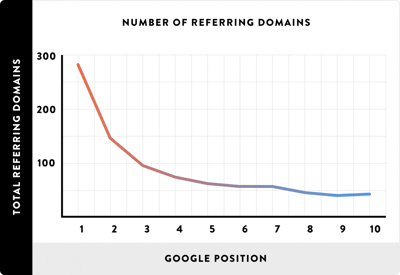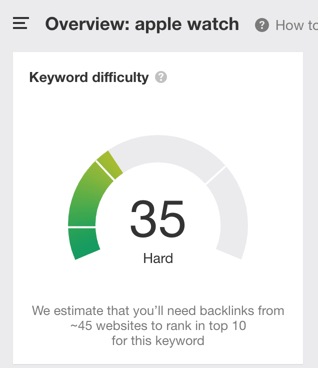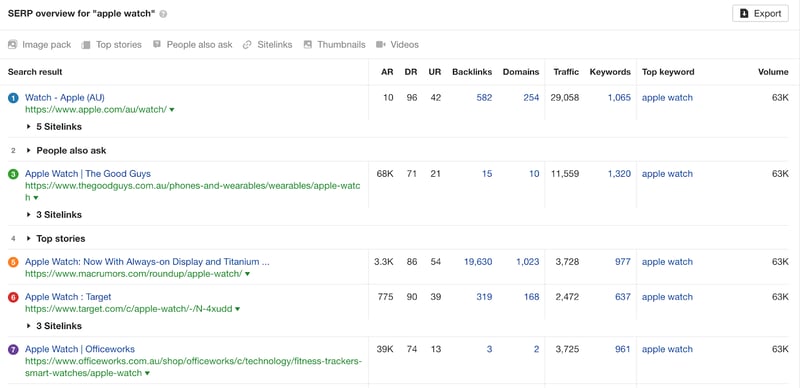The core pillars of SEO are:
- Technical
- Off-site
- Content
There are wafts of information out there on ranking signals. It generally falls into technical or ‘on-site’ SEO, content or ‘relevance’, and backlinks or ‘off-site’ SEO.
We can control technical and content SEO. We can do keyword research, create content based on that, optimise title tags and metas. We can fix structural issues at their core with smart solutions, with an understanding of how Google crawls and indexes pages.
The core component that is left: backlinks.
The age-old question that often arises, much to the dismay of SEO specialists is: “How many backlinks does it take to rank on page one?”
This question usually comes straight from the potential / current client you’re working with. The answer SEO specialists will go to is: “It depends”. Let’s be real, clients don’t want to hear those words. They want to know when – the year, the month, the day, the hours, and probably even the seconds!
What if we could better predict when a website will see that big success? To hit the first page, and hit number one for their core target keyword. What if instead of saying “It depends”, we could confidently predict “It will take 6 months to hit the first page, no worries”?
How important are backlinks to an SEO strategy?
Think about a website like a bar you own. You’ve made sure it complies with government regulations, you’ve picked your demographic, decorated the interior, and have a ton of booze on offer to serve the dearly inebriated.
How are you going to start getting people through the door?
People may walk past, come in, and have a great time. But, to build up the credibility you need the word of mouth to spread and you need good reviews. It’s those external factors that will get waves of people coming in asking for Pina Coladas and shots.
When it comes to the question of what’s the most important ranking signal? What’s the silver bullet for SEO? The answer is backlinks.
Studies show that the greater number of linking domains a webpage has, the higher up the SERP they will likely be.
For instance, #1 rankings had an average of 168% more domains than those further down the SERP.

Source: https://backlinko.com/search-engine-ranking
Google’s now-famous PageRank Algorithm changed the game. Instead of simply analysing the content of a page, Google looks at how many links to that page came from external sources.
Nearly 20 years later, links are STILL the best way to determine the quality of a webpage. That’s why backlinks remain Google’s go-to ranking signal.
Backlinks are the growth factor that SEO can’t avoid. Gain them and you have the building blocks for a successful campaign.
How many backlinks do I need to get to the top?
There isn’t a straightforward formula for calculating the number of backlinks you need to rank number one. If SEO consultants knew this with 100% certainty, it’d change the entire game.
The critical factor is quality. This can’t be stressed enough.
Google is savvy enough to know that the logic of backlinks help you rank doesn’t mean more backlinks, more rankings.
Based on my experience from seeing long term effects of gaining backlinks, the metrics to critique them with are:
Niche relevance
Website theme and/or content relevant to the industry of the client. This contextualises to search engines and provides relevant authority to that domain.
Domain Authority (DA)
Domain Authority is calculated by evaluating multiple factors, including linking root domains and number of total links, into a single DA score. This score can then be used when comparing websites or tracking the “ranking strength” of a website over time. Domain Authority is not a metric used by Google in determining search rankings and has no effect on the SERPs.
Organic traffic & keyword relevance
The amount of traffic a domain attains is an important factor taken into consideration when acquiring backlinks. Domains with a moderate to a high volume of traffic will equate to a higher click-through rating and help to rank higher for relevant keywords.
When establishing a backlink, it is key to include relevant keywords within the content. Keywords that are relevant to the client/site will leverage rankings and visibility
Writing quality
Domains that contain excellent content that is in-depth, within scope, and meaningful are highly valuable.
Do follow & no-follow
By default, all links are do-follow links unless they are modified. Do follow links pass along what the SEO community commonly calls link juice. Do follows are preferred, however, if you acquire a no-follow from an extremely high-quality domain, you’ll be still in a great spot for boosting your ranking
Not all backlinks are created equal
Backlinks are not created equal. Much like with general ranking signals, each one of these has a scale of which it can hit all these metrics.
One might have a fantastic DA, yet its organic or keyword base might not be as relevant to the website.
You could have the most amazing content piece written about you, but the website barely has DA to make it worth it outreaching for.
Having a high-quality link connected to your website is worth its weight in gold.
There are ways to build links very quickly that can give you those results. However, over time you’re at risk of unbalancing your backlink profile with spammy or low-quality links.
Think of it this way, if you were looking for restaurant recommendations and 1000 people all said: “Check out this place it’s amazing, it will blow your mind away”. Later finding out that they’d never even been there, sampled the food, and perhaps had an obvious cash incentive to endorse it.
Now, what if Gordon Ramsey recommended the same place publicly saying it was the “best pizza in town”. Links are endorsements by entities that are authoritative in the eyes of the public – I’d take the “Gordon Ramsey of backlinks” each and every time if given the chance.
What's the best indication of how many you will need to get to the top?
... Competitors!
Their backlinks are available to us through tools such as SEMRush and AHREFs so we can start digging into what their authority is built on.
One of my most frequently said phrases at StudioHawk is “Competitors have done all the work for you, figure out what they do and steal the good parts”.
How can we gauge it with the tools available?
Moving past ideas like “quality content” and “searcher intent”, the estimation tool that we’re utilising for this is AHERF’s Keyword Explorer tool. Alongside “Keyword Difficulty” This can indicate the average number of websites needed to rank within the top ten of search results.


AHREFs calculates this by taking a “weighted average of the number of linking domains to the current top-10 ranking pages and then plotting the result on a logarithmic scale from 0 to 100.”
Numerous case studies from the past few years show that backlink factors have a higher correlation with rankings than anything else. That’s their Keyword Difficulty (KD) score is based solely on the average number of linking websites to the current top 10 ranking pages, which makes it super easy to comprehend.
While AHREFs does not fully endorse this as the be-all and end of how many links you need, it is helpful. The KD score cuts through on-page factors and tells you what the likelihood is, based solely on the number of referring domains linking to the top-ranking pages for your target keyword.
Let's put it to the test:
I thought, why don’t we analyse websites that have achieved the coveted top 10 ranking in our course. How many backlinks did they gain with us?
What does AHREF estimate they need?
And for those outside the top 20, how long will it take?
The clients I analysed ranked within the top 10 of search results. The majority of their backlink profiles were made up of ones that we acquired as part of our SEO strategy, and the words assessed were clustered around their main organic traffic driver.
I discovered:
On average, when a client has 3-5x the backlinks of AHREFs backlink estimation, they are highly likely to rank within the top 10. This was great for a very small sample base. However, expanding across their entire keyword profile, there were still a ton of low difficulty keywords that were ranking outside the top 10, the perceived ‘low hanging fruit’. Keywords that, according to AHREF, they should have placement for but are not even on the map for.
If you go right now into AHREFs and start checking up on your own website for this, you’ll see variances in the pool of links needed to get on page 1. AHREFs do express that this Keyword Difficulty estimation isn’t an exact figure but, for my own curiosity, it was interesting to see these variances directly through the view of StudioHawk’s client base.
It’s a great tool regardless. Using it you’ll get a snapshot of what you’ll need backlink wise, you’ll see what links they have, you’ll see their quality, even their weaknesses, and can start building your link strategy around this important data.
This can form the basis of your Skyscraper push, use it to fire up the Moving Man Method.
Without a doubt, you’re going to need more quality backlinks to get your website into the top 10 of search results.
A specialists Conclusion
To summarise, getting to the first page of Google is no simple task.
I wish there was a secret formula, but there isn’t one that we can back with 100% certainty.
However, backlinks have been and will continue to be a vital component in achieving the goal of ranking on page one.
Without them and relying solely on other factors, it’s going to be a hard road to start driving organic traffic with only high-value keywords.
The number of backlinks needed will rely on your competitors who are winning out and jockeying for those positions. Strengthen your resources for links based on this.
Key Takeaways:
Backlinks quality over quantity every time.
Use tools like AHREFs & SEMRush to assess competitors’ profiles
Know what you’re up against.
Build your strategy using tried and test techniques to gain more high-quality backlinks than your competitors.
.png)